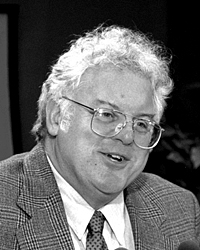On his education at MIT.
Nobel Prize autobiography (1998)
Kontext: I learned about X-ray diffraction, neutron scattering, raman scattering, infrared absorption spectroscopy, heat capacity, transport, time-dependent transport, magnetic resonance, electron diffraction, electron energy loss spectroscopy — all the experimental techniques that constitute the eyes and ears of modern solid state physics. As this occurred I slowly became disillusioned with the reductionist ideal of physics, for it was completely clear that the outcome of these experiments was almost always impossible to predict from first principles, yet was right and meaningful and certainly regulated by the same microscopic laws that work in atoms. Only many years later did I finally understand that this truth, which seems so natural to solid state physicists because they confront experiments so frequently, is actually quite alien to other branches of physics and is vigorously repudiated by many scientists on the grounds that things not amenable to reductionist thinking are not physics.
Robert Betts Laughlin: Citáty v angličtine
Nobel Prize autobiography (1998)
Kontext: Bell Labs had been a kind of holy place of solid state physics since the 1950's when it was built up by Shockley after the invention of the transistor. I had no idea at the time of the significance of this placement, but I did notice during my job talk that everybody understood what I was saying immediately — this had never happened before — and that the audience had an irresistible urge to interrupt, heckle, and argue about the subject matter loudly among themselves during the talk so as to lob hand grenades into it, just like back-benchers do in the House of Commons. Being a combative person I rather liked this and lobbed a few grenades of my own to maintain control of my seminar. I later came to understand that this heckling was a sign of respect from these people, that the ability to handle it was a test of a person's worth, and that polite silence from them was an extremely bad sign, amounting to Pauli's famous criticism that the speaker was "not even wrong."
“The most interesting thing I learned during this time was how small a nuclear warhead was.”
On his experiences in the military during his training on how to fire Pershing missiles.
Nobel Prize autobiography (1998)
Kontext: Oklahoma is laid back and rather beautiful, with rolling brown hills not unlike the ones in California. The Pershing missiles, on the other hand, were not beautiful. They were horrible weapons of war — solid-fuel rockets five feet in diameter at the base, long as a moving van, and capable of throwing a tactical nuclear warhead 500 miles. They were launched from trucks and required a team of 10 men to service and fire. The most interesting thing I learned during this time was how small a nuclear warhead was. The nose cone of a Pershing is only about 18 inches in diameter at the base. I had not been interested at all in nuclear weaponry as a student, and so I had never thought through carefully about their "efficiency". It is sobering thought that these missiles were actually deployed in continental Europe in those days and that on at least one occasion, namely the 1973 Arab-Israel war, there was an alert serious enough to leave the commanding officers trembling.
Nobel Prize autobiography (1998)
Kontext: Real understanding of a thing comes from taking it apart oneself, not reading about it in a book or hearing about it in a classroom. To this day I always insist on working out a problem from the beginning without reading up on it first, a habit that sometimes gets me into trouble but just as often helps me see things my predecessors have missed.
On his experiences in the military during his training on how to fire Pershing missiles.
Nobel Prize autobiography (1998)
Kontext: Oklahoma is laid back and rather beautiful, with rolling brown hills not unlike the ones in California. The Pershing missiles, on the other hand, were not beautiful. They were horrible weapons of war — solid-fuel rockets five feet in diameter at the base, long as a moving van, and capable of throwing a tactical nuclear warhead 500 miles. They were launched from trucks and required a team of 10 men to service and fire. The most interesting thing I learned during this time was how small a nuclear warhead was. The nose cone of a Pershing is only about 18 inches in diameter at the base. I had not been interested at all in nuclear weaponry as a student, and so I had never thought through carefully about their "efficiency". It is sobering thought that these missiles were actually deployed in continental Europe in those days and that on at least one occasion, namely the 1973 Arab-Israel war, there was an alert serious enough to leave the commanding officers trembling.
Nobel Prize autobiography (1998)
Kontext: The world is full of intelligent, well-meaning people who, for one reason or another, did not attend university but are nonetheless well-read and educated. Out there on the prairie lost opportunities of youth were the rule rather than the exception, and I slowly became disabused of the myth of the Bright Young Thing and have not believed in it since.
Nobel Prize autobiography (1998)
Kontext: I realized that nature is filled with a limitless number of wonderful things which have causes and reasons like anything else but nonetheless cannot be forseen but must be discovered, for their subtlety and complexity transcends the present state of science. The questions worth asking, in other words, come not from other people but from nature, and are for the most part delicate things easily drowned out by the noise of everyday life.
1:00:00 to 1:01:00 in video
SETI Talk 2013
Nobel Prize autobiography (1998)
